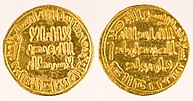Al-Walid I (c. 674 – 715) was the sixth Umayyad caliph, ruling from October 705 until his death. The eldest son of Caliph Abd al-Malik (r. 685–705), he continued his father's efforts to centralize government, impose a more Arabic and Islamic character on the state, and expand its borders. He heavily depended on al-Hajjaj ibn Yusuf, his father's powerful viceroy over the eastern half of the caliphate. During his reign, armies commissioned by al-Hajjaj conquered Sind and Transoxiana in the east, while the troops of Musa ibn Nusayr, the governor of Ifriqiya, conquered the Maghreb and Hispania in the west, bringing the caliphate to its largest territorial extent. Al-Walid financed impressive public works, including the Great Mosque of Damascus, the al-Aqsa Mosque in Jerusalem, and the Prophet's Mosque in Medina. He was the first caliph to institute programs for social welfare, and his reign was marked by domestic peace and prosperity. (Full article...)
